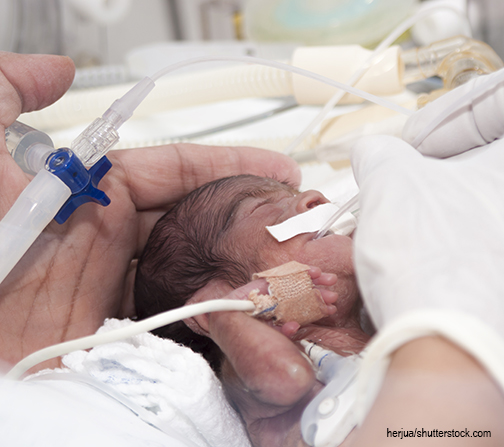Study Shows Biomarker Accurately Diagnoses Deadly Infant Disease
A diagnostic study of 136 premature infants found that a protein involved in managing harmful bacteria in the human intestine is a reliable biomarker for the noninvasive detection of necrotizing enterocolitis (NEC). Led by researchers and clinicians at LSU Health New Orleans School of Medicine, this is one of the largest prospective clinical studies in premature infants yet. Results of the study are published online in JAMA Network Open, available here.
According to the National Institutes of Health, necrotizing enterocolitis is a life-threatening illness almost exclusively affecting neonates. NEC has a mortality rate as high as 50%. Inflammation of the intestine leads to bacterial invasion causing cellular damage and cell death, which causes necrosis of the colon and intestine. As NEC progresses, it can lead to intestinal perforation causing peritonitis, sepsis and death. To date, no clinical test has been established as the gold standard to diagnose NEC. X-rays are used to diagnose advanced disease, but their sensitivity can be as low as 44%.
The gut disease is one of concern in Louisiana, as it has one of the highest rates of premature birth in the country, and it disproportionately affects African-American infants.
Since iAP activity precedes the chemical process triggering inflammation, the researchers studied the abundance and enzyme activity of iAP shed in stool to assess the correlation of two iAP biochemical measures with disease severity. They found that elevated levels of iAP protein linked to NEC were shed in the samples, but the proteins were dysfunctional in the NEC patients. The accuracy rates using iAP levels and iAP activity as markers for severe NEC were 97% and 76%, respectively. The accuracy values were similar for suspected NEC - 97% and 62%, respectively.
The biomarker has doubled the diagnostic identification of the disease, compared to the current gold standard - a milestone important at both the bench and the bedside.
Besides Kim, other members of the research team from LSU Health New Orleans included Drs. Maya Heath, Zeromeh Gerber, Brian Barkemeyer and Duna Penn in the Section of Neonatology in the Department of Pediatrics; Rebecca Buckley, PhD, and Porcha Davis in the Department of Biochemistry and Molecular Biology; and Zhide Fang, PhD, in the Department of Biostatistics in the School of Public Health. Misty Good, MD, Laura Linneman, RN, and Qingqing Gong, PhD, from Washington University School of Medicine and St. Louis Children's Hospital, also participated in the research.
Kim is the founder of a spin-out company, Chosen Diagnostics Inc., whose business interests are related to this project. The company is considering an option to license its diagnostic test developed from this work. Dr. Misty Good has financial relationships with Abbott Laboratories and Astarte Medical Partners.

